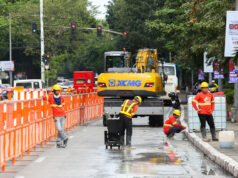Cotabato province hopes to revive rubber industry with trading posts
COTABATO — The provincial government of Cotabato, which is aiming to be one of the country’s top producers and exporters of natural rubber-based products by 2020, plans to set up more trading posts to encourage farmers to maintain as well as develop more rubber areas.
Governor Emmylou Taliño-Mendoza, in her State of the Province Address delivered on March 20, said producers of rubber cup lumps — the raw product from tapping rubber trees — have shown “interest again” in the crop after being discouraged by the record low price of P14 per kilogram (/kg) several years ago.
Last year, the implementing rules and regulations for Provincial Ordinance No. 594 were finalized, paving the way for the establishment of Rubber Trading and Auction Centers, known locally as bagsakan, in several municipalities.
The bagsakans for rubber cup lumps serve as direct trading areas, where farmers can get a higher per kilo price for their produce.
Ms. Mendoza reported that there are now 40 trading centers around the province and the provincial government intends to set up more in at least 10 other areas.
As of January, rubber cup lumps were being bought for P28/kg at the trading posts against P24/kg by other dealers.
In 2011, rubber cup lumps were going for as much as P90/kg.
Ms. Mendoza also announced that the provincial government will continue to roll out programs to encourage production of other agricultural commodities, including oil palm, coconut, coffee, and cacao.
The governor reported that in 2017,145 farmers received 39,647 oil palm seedlings through the Oil Palm Development Program, while about 2,400 coconut planters were trained in production and management techniques.
“We continue to distribute agricultural-grade salt to our coco farmers and 2,066 of them were given a total of 7,600 bags of fertilizer salts last year. One hundred twenty three of our coconut farmers are the newest recipients of 12,160 coco seedlings that we distributed in 2017,” she said.
For coffee, 51 growers from the towns of Magpet and President Roxas as well as Kidapawan City received 26,900 seedlings.
“Our cacao growers were provided with 700 bags of organic cacao. It is inspiring to note that among our successful organic product entrepreneurs, Tree Life has gained world popularity,” Ms. Mendoza said.
Alongside organic farming, the province’s Crop Protection Program is now adopting more natural and environment-friendly measures in fighting pests and diseases with the use of biological control agents and organic fertilizers.
“Last year, when some coconut trees from Dagupan, Makilala were infected with a fungal disease, our neighbor province, South Cotabato came to our rescue, providing trichoderma for fungus management. All trees recovered,” she said.
In terms of trade and investment, Ms. Mendoza said Cotabato, also known as North Cotabato, recorded $8.7 million in export sales and P413.7 million in domestic sales in 2017.
“It is worth mentioning also that our MSMEs or micro, small, medium enterprise, have grown in number and are jointly assisted by the provincial government and the DTI (Department of Trade and Industry) Cotabato Provincial Office,” she said.
Last year, 1,435 new MSMEs were established in addition to the existing 3,016.
“We continually join trade fairs and business marketing and promotion in and out of our province and even abroad to support our entrepreneurs because we believe in the important contribution of trade and industry in our competitiveness as a province,” Ms. Mendoza said. — Maya M. Padillo



